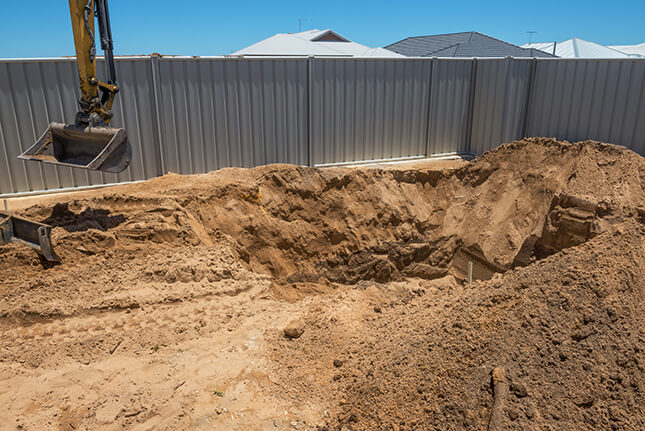The most challenging part of making a pool is the actual digging itself. It’s worth it, of course; what better way to enjoy the Australian summer than with a pool in your backyard? It just needs to be planned and executed well, so that the pool doesn’t create complications down the track.
The best way to create space for a pool is to use an excavator. These machines have ‘arms’ that swivel and retract, allowing you to work with them in tight spaces. You’ll need to be able to get them into your backyard to dig, of course, though the smaller ones don’t require much of an access space – two metres width and height as standard. However it’s something to consider up-front because in really tight conditions you might need the added expense of using a crane to get the excavator over the home building), and they can be slow and noisy to operate, but the result is a more precise hole in the ground for the pool to go into.
Many people choose to construct their own pools; a real DIY achievement. At the same time, you’ll want someone experienced with these projects at least in a supervisory role during the excavation stage, because things can go wrong.
Here are just some of the things that you’ll need to keep in mind during excavation:
1. How close is the home to the boundary of the pool?
If the distance between your home and the boundary of the pool is less than 1.2 metres, you may well find that you’re going to have to dig the space by hand, in order to avoid potential damage to the home or structures. There are very small excavators that can assist with hand digging projects, but these tend to be slow and expensive to operate.
2. How will you dispose of the soil?
A standard pool takes around six truckloads of soil; renting an excavator is not enough in itself; you’ll also need a truck to remove the soil, and a place to dump it. Check with regulations in your area for the removal of soil. You’ll need to keep about 20 percent of it on hand in order to backfill the pool once the concrete has been set in. Don’t forget!
3. Safety first
The actual digging process will take a day or two, but until the pool is installed you’re then going to have a very deep hole in the garden. It’s a good idea to set up temporary fencing around the site as work is undertaken.
4. Dig a little more than necessary
You’ll already have your plans for the pool, so you know how large it will be and the shape it will take in the garden. It’s also important to dig a little extra space (one metre on both length and width, and then 400mm deeper) than the plans, in order to allow the concrete shell to properly fit. Once the pool is installed, this gap can then be backfilled before further work on the pool can be undertaken.
5. Do you need soil stabilisation?
One of the most important reasons to have an expert on hand to oversee the pool construction project is so that it can be determined if the construction of the pool might undermine the integrity of the home, or any other building on – or adjacent to – the property. In the event that it is determined that digging a pool hole would put the building at risk, then it might be important to undertake a soil stabilisation process first.
At times, there will be the need to do chemical grouting to the soil before it can be excavated. This is a process where liquid cement is pumped into the soil to make it hard prior to excavation. It adds cost to the project, but depending on the size of your property, or your plans for your pool it might be a necessary expense.
If you’re looking to hire an excavation company to do the project instead (and, unless you’re very confident, it’s really the best way to go), take your time to look around for the right ones to do the job. It’s often not going to be the cheapest option; the costs in having a pool excavation go wrong can be extreme. Hire a reputable excavator like Solution Plant Hire – we have a proven track record and who will be able to give you best advice on the challenges that you’ll face in getting the pool space dug in the way that you envision.
Getting advice on digging your pool space
A professional excavation service will also know exactly what equipment is right for the project. If you’re undertaking the project yourself, again consider engaging with an expert to get their advice on which is the best excavating equipment for your pool project.




